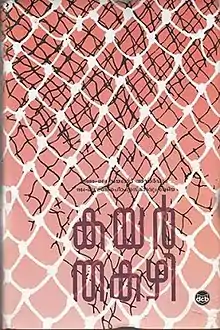 1984 edition | |
| Author | Thakazhi Sivasankara Pillai |
|---|---|
| Translator | N. Sreekantan Nair |
| Country | India |
| Language | Malayalam |
| Genre | Novel |
| Publisher | DC Books (Malayalam), Sahitya Akademi (English) |
Publication date | 1978 |
Published in English | 1998 |
| Pages | 986 |
| Awards | Vayalar Award |
| ISBN | 9788171300716 |
Kayar (transl. Coir) is a 1978 Malayalam epic novel written by Thakazhi Sivasankara Pillai. Widely considered one of the most seminal works in Malayalam literature,[1][2] Kayar received many major literary awards, including the Vayalar Award.[3]
Plot summary
Set in Kuttanad, the novel traces the evolution of the central Travancore society from the early 19th century to the mid-twentieth century. It covers more than two centuries of Kerala life, encompassing six generations of characters. The historic transformation of man's relationship with land, as also between man and man, men and women and even man and God, forms the staple theme of Kayar.
Background
The idea of a novel which contains the vignettes of social life in Kerala stayed in the author's mind for many years. "Two hundred and fifty years of Kerala life flowed past my mind's eye. But I needed a form. I could find no help from the Western classics," Thakazhi reminisces. For years he carried the "germ" inside his head. One night, as he lay sleepless in bed, the Mahabharata epic with its episodic structure drifted into his mind as a possibility. The next day he started work on Kayar. It took him three years to complete the book.[4]
Translations
- Coir: English translation by N. Sreekantan Nair; Sahitya Akademi; 1998
- Kayiru: Tamil translation by C.A. Balan; Sahitya Akademi; 2003
- Hagga: Kannada translation by K.K. Nair and Ashok Kumar; Sahitya Akademi; 2007
- Rassi (1995), Hindi translation by Sudhanshu Chaturvedi. For this, Chaturvedi has won Sahitya Akademi Award for translation.[5]
Adaptations
- Bhayanakam (2018), directed by Jayaraj.
Awards
- 1980: Vayalar Award
References
- ↑ Jayasree, G. S. (3 August 2008). "Decolonising the land". The Hindu. Retrieved 22 December 2019.
- ↑ K. Ayyappa Panicker (24 April – 7 May 1999). "The end of historiography?"[usurped]. Frontline. Retrieved 2 July 2013.
- ↑ https://sahitya-akademi.gov.in/library/meettheauthor/thakazhi_sivasankara_pillai.pdf
- ↑ Malayalam Literary Survey — Volume 20, Issues 1-21. Kerala Sahitya Akademi. 1998. p. 86.
- ↑ "..:: SAHITYA : Akademi Awards ::." sahitya-akademi.gov.in.
External links
- Kayar at DC Books official website
- Review of the English translation by M. Mukundan (India Today)
- Review of the Tamil translation by Neela Padmanabhan (The Hindu)
- Review of the Kannada translation by V. Gopalakrishna (The Hindu)